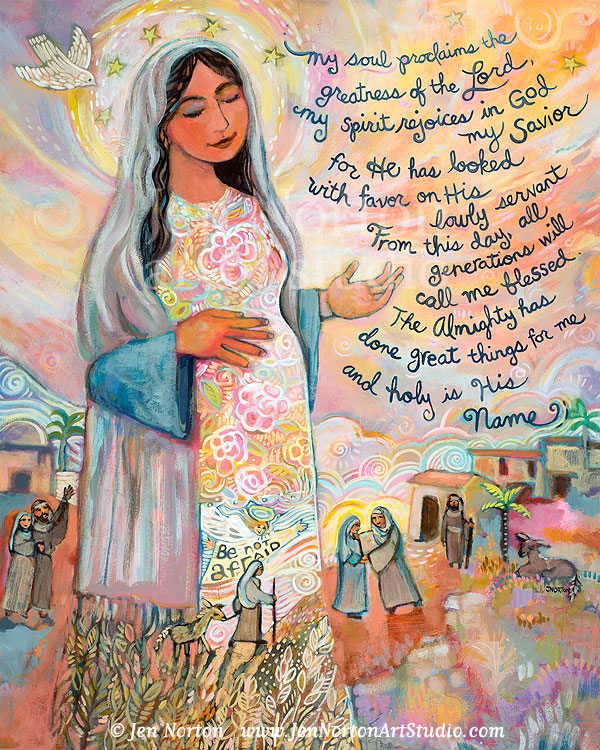I never really pondered the “Canticle of Mary” (aka the “Magnificat”) before I was contacted by author Jerry Windley-Daoust about licensing an image for his soon-to-be released illuminated guide to the Joyful Mysteries of the rosary. It’s a good story to recall during Advent…the story of Mary’s waiting and anticipation before the birth of her Son. It is a uniquely feminine call by a new mother to join in the salvation of the world. But I also reflect that in some ways it is the song of each of us to willingly accept our place in God’s plan…to say “yes” to a bigger life than we might have imagined.
To understand the significance of the Magnificat, I looked back to the Annunciation. I imagined Mary, a young teenaged girl going about her everyday village life, slated to marry a nice carpenter and become a typical Nazarean wife. Then the Angel Gabriel shows up and throws a first-century wrench into her plans. Things aren’t going to go as expected. I’m going to make an assumption here: I’m pretty sure when an Angel of God appears, you KNOW it’s an Angel. It’s not an intuition or merely a breeze. One big clue is that when Angels appear, they always start off by saying “Be not afraid!” I don’t know about you, but I’ve never been particularly frightened by an intuitive feeling.
So let’s assume the angel is clearly and Angel. When he says, “…the Holy Spirit will come upon you, and the power of the Most High will overshadow you” and you will have a son, she knows he’s not kidding. And not just any son, but THE Son of THE God! Even though she has had no relations with a man. Even though in her society she will be shunned and maybe even stoned for this inconvenience. But Mary, without sin and with unfathomable and unwavering belief responds, “Behold, I am the handmaid of the Lord. May it be done to me according to your word.”
Mary said “Yes.”
Would I have been so willing? I’m not sure. If I imagine myself in Mary’s place, I have to believe she didn’t run out to all her friends and enthusiastically announce her pregnancy. In spite of admonitions to “Be not afraid”, I bet she was afraid. Just a little. She would have had to inform her parents and Joseph, but then I bet they all kept this little secret to themselves.
So she goes to visit her kinswomen Elizabeth, traveling “in haste” to her home in the hills. She appears to go alone, a little stealthy. The quickness of her departure makes me think her parents might have wanted to protect her from the backlash of her community. Angel or no angel… a young unmarried girl who becomes pregnant is vilified in both modern and ancient times. So off goes Mary, torn between possibility and fear, to seek refuge and comfort with a fellow pregnant woman in the hills. I bet she wasn’t expecting the welcome she got!
Elizabeth and her husband Zechariah had been privy to some Godly insights of their own. Zechariah, a priest, also experienced an Angelic visit (complete with the greeting of “Do no be afraid”) telling him of a son he and his wife would bear in their advanced age. He was told of his son’s purpose, his name, and then struck silent until the birth as a sign of its truth.
So here comes Mary, up the hill to Elizabeth, who immediately recognizes the fulfillment of God’s promise in her young cousin. We are told her baby “leaped in her womb” and Elizabeth greets Mary with “Most blessed are you among women, and blessed is the fruit of your womb. And how does this happen to me, that the mother of my Lord should come to me?… Blessed are you who believed that what was spoken to you by the Lord would be fulfilled!”
And while the bible doesn’t offer us any more in the way of emotional context, I can only imagine as a woman, that there was a great sense of relief in that recognition. All of Mary’s doubts and fears must have dissolved as she was fully validated in Elizabeth’s greeting. She is transported from tentative teen to a full realization of her destiny in the salvation of Israel as she says,
My soul proclaims the greatness of the Lord;
my spirit rejoices in God my savior.
For He has looked with favor on His lowly servant.
From this day, all generations will call me blessed.
The Almighty has done great things for me,
and holy is His Name.
His mercy is from age to age
to those who fear him.
He has shown might with is arm,
dispersed the arrogant of mind and heart.
He has thrown down the rulers from their thrones
but lifted up the lowly.
The hungry he has filled with good things;
the rich he has sent away empty.
He has helped Israel his servant,
remembering his mercy,
according to his promise to our fathers,
to Abraham, and to his descendants forever.
Mary said “Yes” to God’s plan and the world was forever changed. Who knows what would happen if we all said “Yes.”
Art prints of this piece are available in my Etsy store and my Fine Art America store. Original is sold.
The reflections for this painting are from Luke 1: 1-56. The Canticle of Mary is found in Luke 1:46-55.
I chose to illustrate this painting with the feminine pink hues used in the liturgies of Gaudete Sunday, the 3rd Sunday of Advent. Gaudete means “rejoice” and the day is a celebration of joy knowing that Christmas is near.





